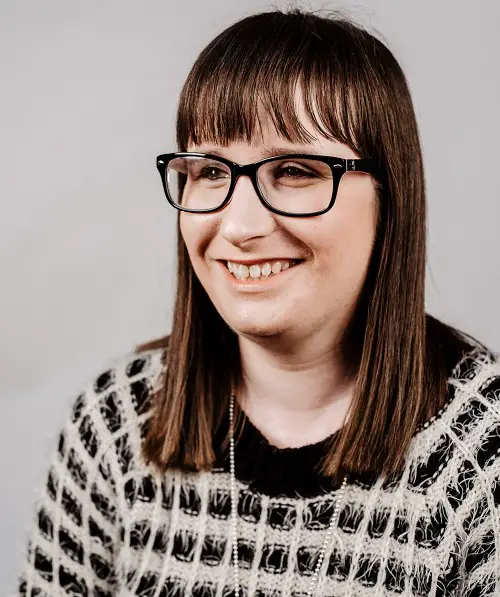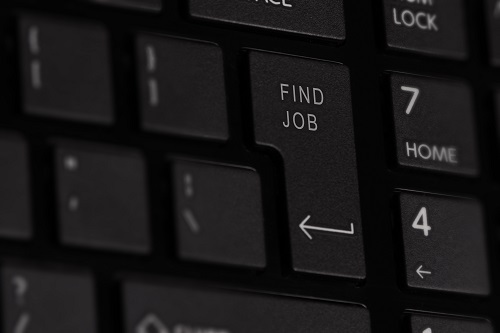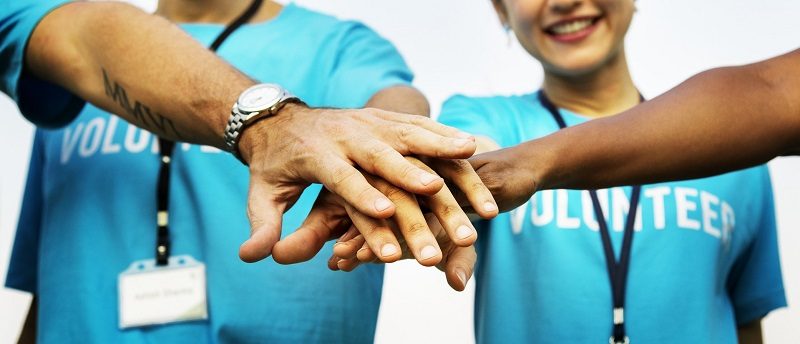
Top tips to help you find for a job if you have a disability
This is an updated post from our archives.
It explores top tips for disabled people seeking work, including advice on CV writing, disclosure of disability, and accessing support services to improve employability.
Are you disabled and currently looking for a job? We’ve heard countless stories of people struggling to find work. But there are things you can do to get to where you want to be – and there are plenty of disabled people who are proof of that. Holly, who is visually impaired and works as an Assistive Technology Officer, is just one example. So we’ve asked her to share a post from her blog, Life of a Blind Girl, on the top tips for disabled job hunters.
There’s no denying that looking for a job can be difficult, even more so for disabled people. Employers have outdated and wrongly perceived ideas about employing disabled people, which adds an extra barrier for us.
There are so many questions surrounding disability and employment, such as:
- what jobs are accessible?
- when do I disclose my disability?
- what will I do if the application form isn’t accessible?
These are just to name a few. Many people who have recently been diagnosed with a disability may be wondering what jobs they can do, especially if they are no longer able to do their current role. Or they might be wondering what adjustments can be made. Rightly so as well, as all of these topics are so important.
People often ask me: “How did you get your job?” There’s no denying that it was hard for me. I came across countless jobs that I couldn’t do because of my visual impairment. Employers don’t always look beyond a person’s disability, which prevents them from having an interview or even getting the job.
Looking at job websites and seeing tons of jobs that aren’t accessible can make you feel very unmotivated and frustrated.
I managed to get a job within six months of graduating from university in 2017. Constant hard work and determination paid off in the end. However, I did face quite a few rejections. But, when I think about it, they helped me get to where I am today.
For some people, rejection can be a downward spiral. But I hope that my experiences can offer others some useful tips. I know I could have done with something like this when I was job searching.

Before you read on, I just want to point out that I’m in no way an expert in this area. I’m just talking from my own experiences and those of people that I know.
Have an idea of what field you want to go into
This is so important, regardless of whether you have a disability or not, but is key when you do have one as you can base your search on jobs that are in that specific field. Know what jobs are in the area you want to go into and make sure that you know where they will be advertised.
Make a list of job websites and regularly check them
Many companies advertise jobs on other websites in order to reach a wider audience. Websites such as Indeed, Total Jobs and The Guardian Jobs are some examples. They are fully accessible as well, which is a bonus.
Depending on what sort of job you’re looking for, it may be a good idea to check local websites as well, such as your local paper, colleges, schools, the local council or universities for employment opportunities. You may be surprised by how many jobs are advertised on such websites.
On some websites, you can set up email alerts for when new jobs are added. This is extremely useful as it means that you don’t have to check them on a daily basis and you will instead be notified when new jobs come up that match your criteria.

Contact companies directly
By this, I certainly don’t mean begging a company to give you a job. Let me explain…
Not all companies advertise on external websites; some prefer to only advertise current job vacancies on their own website. Have a think about what organisations are in your desired field, make a list of them and check their websites. You may be able to set up email alerts, but if not, check them on a regular basis, particularly if it’s an employer that you would really like to work for.
Checking several websites may be a tedious task, but it will hopefully be worth it in the long run!
Knowing someone that works in the field you want to go into can be a great way of finding out about employment opportunities in that area. This can be very daunting and you might feel rude doing this. But it could be very useful.
Also, tell family and friends that you’re looking for a job. They may be able to help you with your search or send you any jobs that they think might be suitable.
Make use of specialist services available to you
Making use of specialist services can be a great way of looking for jobs and receiving careers advice. Disability organisations offer a wide range of services relating to employment. For blind and partially sighted people in the UK, the RNIB offers support and advice on all aspects of applying for a job – from job searching, to preparing for an interview and so much more.
The disability charity Scope also offers a wide range of services for disabled people looking for employment, including online and telephone support for people applying for jobs in England and Wales.
Local charities and organisations may also offer employment support, so it is worth contacting them to see if they can be of any help.
Making use of these services can really help you when applying for jobs. They are there for disabled people so why not make use of them?

Look for disability-friendly employers
This isn’t a necessity, but if this is an important part of your job search, then there are a couple of ways of finding disability-friendly employers.
The Government’s Disability Confident Scheme is designed for employers to recruit disabled people for their skills and talent.
The Business Disability Forum is an organisation that makes it rewarding for employers to employ disabled people.
These are both helpful resources, but there is no absolute way of identifying disability-friendly employers.
If you’re a graduate, then look at internships
I know that this won’t apply to everyone, but if you are a recent university graduate or about to finish studying then doing an internship can be a great way of gaining some experience in the workplace. They are often paid roles as well.
Many employers offer internships. One specifically for disabled people is Leonard Cheshire. It offers an internship programme where they bring together UK employers and talented disabled students. Internships are definitely worth looking into.
Employability is a portal of current vacancies for disabled students
If you have a visual impairment, Blind in Business offers training and employment services for students and graduates, so it is definitely a useful contact.
Do some volunteering

Many charities and organisations are often looking for volunteers. This can be a great way of getting valuable experience and gaining new skills. Volunteering is unpaid, but nevertheless, volunteering is very rewarding and looks great on your CV. I wrote a blog post for Scope on the importance of volunteering, so if you’re in need of some inspiration, check it out.
Know your CV
Not all employers accept CVs, so you might have to fill in an application form to apply for a job. Knowing your CV can make this process easier. If employers do accept CVs, make sure yours fits the job you’re applying for. Also, make sure it is up-to-date.
Think of what you can do, not what you can’t
When looking for jobs, you may regularly come across jobs that you think you can’t do because of your disability. But there are so many jobs that you can do. We can often get bogged down in the negatives rather than focusing on the positives.
As a blind person, one question that I often get asked is; “what jobs can blind people do?” The list is practically endless. Obviously, there are limitations and certain jobs that we can’t do. But there are far more jobs that we can carry out. With the right support and adaptions, we can do jobs to the same standard as non-disabled people.
Editor’s tip: Sometimes, that means using assistive tools on a budget-friendly refurbished desktop computer—something that’s both practical and accessible for many.
Don’t give up!
I think this is the most important piece of advice that I can give. It can often feel disheartening, upsetting or frustrating when you are faced with disappointment when looking for work. But it is very important that you don’t give up and feel discouraged. Determination, dedication and hard work will pay off in the end!
There you have it, some top tips on looking for a job if you have a disability. I hope this post has been useful to some of you.
Do you have any other tips to share? Feel free to leave them in the comments.
By Holly
Updated Job Search Advice for Disabled People in 2025
Finding a job as a disabled person can still feel daunting, but many things have improved since this post was first published. More companies are embracing inclusive hiring practices, and assistive technology makes workplaces more accessible than ever.
If you’re starting your job hunt, begin by identifying your skills and strengths. Use resources like the UK government’s National Careers Service to explore suitable roles.
New Tools and Platforms
Job sites like Evenbreak, Disability Jobsite, and VERCIDA specialise in inclusive employers who actively seek disabled talent. These platforms often offer advice and accessible application options too.
Workplace Adjustments and Access to Work
The UK government’s Access to Work scheme continues to be a lifeline, offering funding for specialist equipment, support workers, and travel costs. Many people aren’t aware they can also receive help with mental health support through this scheme.
CV Tips with a Disability Focus
You don’t have to disclose your disability unless you want to. If you do, frame it positively – perhaps highlighting how you’ve overcome barriers or developed unique skills like adaptability and resilience. Ensure your CV follows accessible formatting guidelines (e.g. clear headings, sans-serif fonts, no colour-reliant information).
Useful Products for Your Job Hunt
If you are a wheelchair user and use a laptop consider a trabasack wheelchair tray to work on the go.
Expert Insights
The 2024 Disability Equality Index reveals significant progress in disability inclusion across leading businesses, particularly in leadership and accessibility. Notably, 71% of participating companies now require that their digital products are accessible and usable by individuals with disabilities, up from 64% in 2023. Additionally, 45% of companies are publishing diversity reports that include disability data, nearly doubling from 24% the previous year. However, the report also highlights ongoing challenges, such as boardroom inclusion, with only 11% of companies reporting an openly disabled director on their corporate board and just 3% voluntarily reporting on disability at the board level. These findings underscore both the advancements and the areas where further action is needed to achieve full disability inclusion in the workplace
Final Thoughts
Your skills are valuable, and inclusive workplaces do exist. Stay persistent, lean on available support, and use every resource at your disposal.